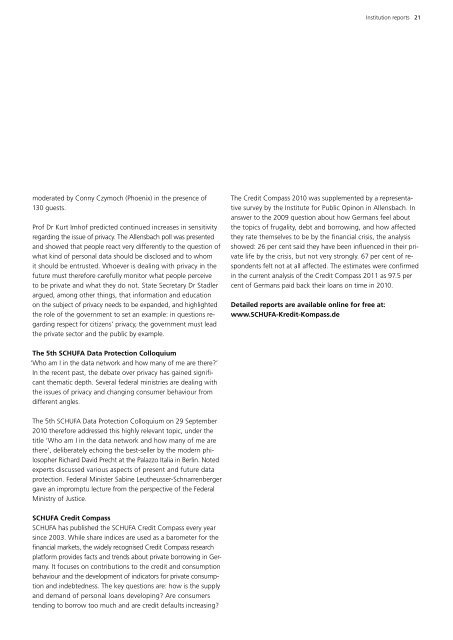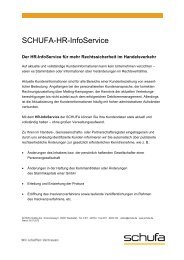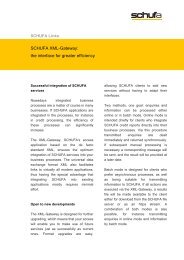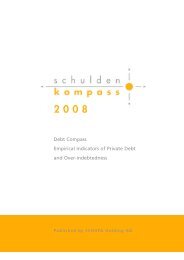2010 (PDF, 1.1 MB) - Schufa
2010 (PDF, 1.1 MB) - Schufa
2010 (PDF, 1.1 MB) - Schufa
Create successful ePaper yourself
Turn your PDF publications into a flip-book with our unique Google optimized e-Paper software.
moderated by Conny Czymoch (Phoenix) in the presence of<br />
130 guests.<br />
Prof Dr Kurt Imhof predicted continued increases in sensitivity<br />
regarding the issue of privacy. The Allensbach poll was presented<br />
and showed that people react very differently to the question of<br />
what kind of personal data should be disclosed and to whom<br />
it should be entrusted. Whoever is dealing with privacy in the<br />
future must therefore carefully monitor what people perceive<br />
to be private and what they do not. State Secretary Dr Stadler<br />
argued, among other things, that information and education<br />
on the subject of privacy needs to be expanded, and highlighted<br />
the role of the government to set an example: in questions regarding<br />
respect for citizens’ privacy, the government must lead<br />
the private sector and the public by example.<br />
The 5th SCHUFA Data Protection Colloquium<br />
‘Who am I in the data network and how many of me are there?’<br />
In the recent past, the debate over privacy has gained significant<br />
thematic depth. Several federal ministries are dealing with<br />
the issues of privacy and changing consumer behaviour from<br />
different angles.<br />
The 5th SCHUFA Data Protection Colloquium on 29 September<br />
<strong>2010</strong> therefore addressed this highly relevant topic, under the<br />
title ‘Who am I in the data network and how many of me are<br />
there’, deliberately echoing the best-seller by the modern philosopher<br />
Richard David Precht at the Palazzo Italia in Berlin. Noted<br />
experts discussed various aspects of present and future data<br />
protection. Federal Minister Sabine Leutheusser-Schnarrenberger<br />
gave an impromptu lecture from the perspective of the Federal<br />
Ministry of Justice.<br />
SCHUFA Credit Compass<br />
SCHUFA has published the SCHUFA Credit Compass every year<br />
since 2003. While share indices are used as a barometer for the<br />
financial markets, the widely recognised Credit Compass research<br />
platform provides facts and trends about private borrowing in Germany.<br />
It focuses on contributions to the credit and consumption<br />
behaviour and the development of indicators for private consumption<br />
and indebtedness. The key questions are: how is the supply<br />
and demand of personal loans developing? Are consumers<br />
tending to borrow too much and are credit defaults increasing?<br />
Institution reports 21<br />
The Credit Compass <strong>2010</strong> was supplemented by a representative<br />
survey by the Institute for Public Opinon in Allensbach. In<br />
answer to the 2009 question about how Germans feel about<br />
the topics of frugality, debt and borrowing, and how affected<br />
they rate themselves to be by the financial crisis, the analysis<br />
showed: 26 per cent said they have been influenced in their private<br />
life by the crisis, but not very strongly. 67 per cent of respondents<br />
felt not at all affected. The estimates were confirmed<br />
in the current analysis of the Credit Compass 2011 as 97.5 per<br />
cent of Germans paid back their loans on time in <strong>2010</strong>.<br />
Detailed reports are available online for free at:<br />
www.SCHUFA-Kredit-Kompass.de
















